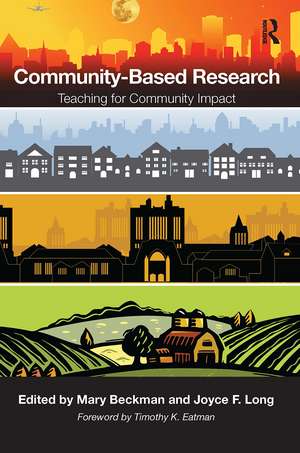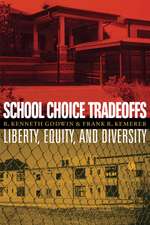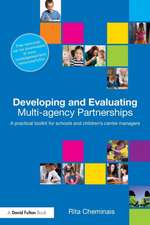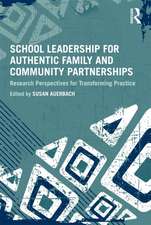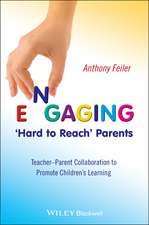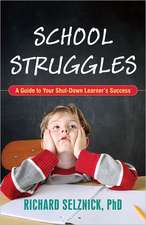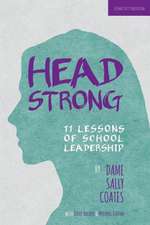Community-Based Research: Teaching for Community Impact
Editat de Mary Beckman, Joyce F. Longen Limba Engleză Paperback – 30 mar 2016
| Toate formatele și edițiile | Preț | Express |
|---|---|---|
| Paperback (1) | 319.34 lei 6-8 săpt. | |
| Taylor & Francis – 30 mar 2016 | 319.34 lei 6-8 săpt. | |
| Hardback (1) | 1006.60 lei 6-8 săpt. | |
| Taylor & Francis – 6 apr 2016 | 1006.60 lei 6-8 săpt. |
Preț: 319.34 lei
Nou
Puncte Express: 479
Preț estimativ în valută:
61.10€ • 63.80$ • 50.57£
61.10€ • 63.80$ • 50.57£
Carte tipărită la comandă
Livrare economică 04-18 aprilie
Preluare comenzi: 021 569.72.76
Specificații
ISBN-13: 9781620363560
ISBN-10: 1620363569
Pagini: 366
Dimensiuni: 152 x 229 x 23 mm
Greutate: 0.68 kg
Ediția:1
Editura: Taylor & Francis
Colecția Routledge
Locul publicării:Oxford, United Kingdom
ISBN-10: 1620363569
Pagini: 366
Dimensiuni: 152 x 229 x 23 mm
Greutate: 0.68 kg
Ediția:1
Editura: Taylor & Francis
Colecția Routledge
Locul publicării:Oxford, United Kingdom
Public țintă
Postgraduate and Professional Practice & DevelopmentCuprins
Figures and Tables Foreword Timothy K. Eatman Acknowledgments Introduction Mary Beckman and Joyce F. Long PART ONE. DEFINITIONS, ORIENTING FRAMEWORKS, AND PARTNERS Mary Beckman 1. The Language and Methods Of Community Research James M. Frabutt and Kelly N. Graves 2. The Role of Community-Based Research in Achieving Community Impact Mary Beckman and Danielle Wood 3. Community-Based Research From the Perspective of the Community Partners Jessica Quaranto and Debra Stanley 4. Why Teach Community-Based Research? A Story of Developing Faculty Interest Joyce F. Long, Paul Schadewald, and Brooke Kiener PART TWO. GUIDING COMMUNITY-BASED RESEARCH TOWARD COMMUNITY OUTCOMES AND STUDENT LEARNING Joyce F. Long 5. The Power Model Five Core Elements for Teaching Community-Based Research Jennifer M. Pigza 6. Applying the Power Model in a Second-Language Class Rachel Parroquin with Emily Geiger-Medina 7. Multicampus Partnerships Studying the Feasibility of Buying Local Christopher S. Ruebeck 8. Meeting The Objectives Of Faculty Engagement In Undergraduate Community-Based Research Projects Anna Sims Bartel and Georgia Nigro 9. Mathematical Modeling + A Community Partner = the Fulfillment of Student Learning Objectives Ethan Berkove 10. Strategic Training Goals Preparing Graduate Students to Conduct School-Based Action Research Anthony C. Holter and James M. Frabutt 11. Working Through the Challenges of Globally Engaged Research Elizabeth Tryon and Norbert Steinhaus 12. Deepening Levels of Engagement What Works, What Doesn’t, and the Important Role of a Community-Based Research Center Judith Owens-Manley 13. Engagement With the Common Good Curriculum and Evaluation of a Long-Term Commitment Amy Lee Persichetti, Beth Sturman, and Jeff Gingerich 14. Reflections on a Graduate Student’s Dissertation Experience Using Community Data for Research and Mentoring Jody Nicholson PART THREE. COMMUNITY-BASED RESEARCH IN COMMUNITY-WIDE LONG-TERM EFFORTS Mary Beckman 15. The Poverty Initiative in Rockbridge County, Virginia Don E. Dailey and David Dax 16. Learning to Co-Construct Solutions to Urban School Challenges in Los Angeles Adrianna Kezar and Sylvia Rousseau 17. Community-Based Research and Development in Haiti Leveraging Multiple Resources for Maximum Impact Anthony Vinciguerra 18. Progressive Projects on Parent Involvement Joyce F. Long Conclusion Themes, Challenges, and Thoughts About the Future Mary Beckman Editors and Contributors Index
Notă biografică
Mary Beckman is the Associate Director for Academic Affairs and Research at the Center for Social Concerns, University of Notre Dame. Her publications can be found in journals including Journal on Excellence in College Teaching, Journal of Higher Education Outreach and Engagement, Review of Radical Political Economics, Women's Studies Quarterly, and in books, for example, Handbook of Engaged Scholarship: The Contemporary Landscape Volume Two (2010) and Teaching the “isms”: Feminist pedagogy across the disciplines (2010). Joyce F. Long is a research analyst in Memorial Hospital-South Bend’s Community Health Enhancement Department.
Recenzii
“Bringing the university and the community into effective learning and mutual contribution is one of our country’s greatest needs. This book provides both breadth and depth in CBR and gives insights into the future direction of moving service-learning into community enhancement.”
Rev. Dr. Carmen Porco, CEO, Housing Ministries of American Baptists in Wisconsin; and President
Porco Consulting
“We highly recommend Beckman and Long’s Community-Based Research: Teaching for Community Impact, both to those who are new to CBR as an engaged learning strategy and to experienced practitioners who are seeking fresh ideas. The pairing of two concise theoretical frameworks for planning and conducting CBR projects—the community impact framework and the POWER model—with several case studies involving different settings, diverse issues, and various pedagogical models achieves two important objectives. First, it gives readers a strong sense of the potential power of CBR as an engaged learning strategy that is capable of simultaneously enriching the student learning experience and producing meaningful benefits for community partners. Second, it gives readers sufficient grounding in the realities of CBR as an engaged learning strategy to make informed choices about how to design their own efforts.”
Journal of Higher Education Outreach and Engagement
"Community-Based Research would be a good book for faculty members interested in designing CBR projects with students to enhance their learning and help them make connections between theory and practice. It could also help them connect the meta and lived narratives circulating in the literature and public spaces. As Long acknowledges, 'there is still much more work to be done in documenting student outcomes linked to CBR', but this book contributes to this ongoing research. The text is particularly effective in the way it accounts for the unique roles students have played in CBR (e.g., as a change agent, active citizen, allied community member, and co-author). This book would also be a valuable resource for community members, students, and faculty members who want to work in solidarity with one another to strengthen the communities they share. It would also improve the lived conditions of one another and their neighbors both locally and globally."
Teachers College Record
“Beckman and Long provide the reader with a wide range of case studies that demonstrate how community-based learning [CBR] can impact the community for good. They distill useful lessons and principles to guide the development of partnerships that organize collaborative research work in ways that demonstrably impact the community to bring about changes that promote social justice. This book fills a gap in the development of the CBR field while simultaneously equipping CBR partners to engage in meaningful, transformative work.”
Sam Marullo, Professor of Sociology and Director of Wesley Theological Seminary’s Institute for Community Engagement; former Professor and Chair of Sociology and Senior Research Fellow
Sam Marullo, Professor of Sociology and Director of Wesley Theological Seminary’s Institute for Comm
“This volume is an outcome of a federal grant designed to support and expand the practice of high-quality community-based research in colleges and universities across the United States. This book shows how it is possible to emphasize both student learning and community impact. The principles of community-based research are grounded in practical examples from a variety of disciplines; the range of models and disciplines should spark new ideas for courses and long-term community collaborations.”
Trisha Thorme, Director, Community-Based Learning Initiative (CBLI), Princeton University; and Coleader
Corporation for National and Community Service Grant "National Community-Based Research Networking"
"Never before have the opportunities for campus-community research partnerships been so abundant and diverse. Hospitals, social service agencies, juvenile corrections, education, and health services are just a few of the community-based organizations wanting to measure the validity of their work through outputs, outcomes, and impact. However, these organizations do not usually have staff with the skill-set to develop meaningful research. For years, community-benefit investment was measured by process indicators, such as program attendance, or satisfaction surveys. Speaking from the community, we did not know how to begin, nor have the scientific discipline to reach decision-making indicators, which would lead to change and ultimately, to constructive change over-time.
Community-Based Research: Teaching for Community Impact is like an operation manual to move from the publish-or-perish doctrine to conducting real-world research, which can make significant differences to where you work, live, and play. CBR can be a powerful conduit to improving the well-being of the community, while simultaneously educating all the various individuals engaged in the resolution of an issue or problem. Collaboration, communication, synergism, innovation, respect, and transparency are identified as key components for transformative change on a large scale. The authors drill to the epicenter of identifying targets for change, decisions being made, and moves outward to the valid measurement for long-term, sustainable change within the community.”
Margo DeMont, PhD, Executive Director
Community Health Enhancement, Memorial Hospital of South Bend, Indiana
“Community-based research changes lives. This book can transform the way you teach and do research and the impact your work has on students and communities near and far.”
Daniel Lende, Associate Professor of Anthropology
University of South Florida
“Skillfully organized, thoroughly researched, and clearly written, Beckman and Long have succeeded in assembling a collection of expert scholar-practitioners, each of whom provides evidence and practical advice for planning and conducting community-based research [CBR]. . . . A timely, refreshing, and major contribution to the existing literature on CBR, this book will stimulate and guide professors, students, community partners, and other professionals working in university and community settings.”
Nicholas Cutforth, Professor, Morgridge College of Education
University of Denver
“This volume makes an important contribution to the growing literature on community-based research. With its focus on teaching and practice of CBR, this book is a needed resource for scholars and practitioners around the world who are building capacities for impactful research contributing to societal changes. Many interesting case studies make this volume engaging and real.”
Joanna Ochocka, Executive Director, Centre for Community-Based Research; Associate Professor Adjunct
University of Waterloo; and Vice-Chair, Community Based Research Canada
“In an environment in which some governors insist a college’s worth should be measured only by the number of graduates getting high-paying, high-demand jobs, this book reminds us that many students achieve a different kind of education: one that cultivates an ethos of investigative care about solving problems faced by the very communities in which they live and will work. That’s the kind of education that really prepares graduates to be the workers our country needs: competent, collaborative, solutions-oriented, and invested in the greater good.”
Caryn McTighe Musil, Senior Scholar and Director of Civic Learning and Democracy’s Initiatives
Association of American Colleges and Universities
Rev. Dr. Carmen Porco, CEO, Housing Ministries of American Baptists in Wisconsin; and President
Porco Consulting
“We highly recommend Beckman and Long’s Community-Based Research: Teaching for Community Impact, both to those who are new to CBR as an engaged learning strategy and to experienced practitioners who are seeking fresh ideas. The pairing of two concise theoretical frameworks for planning and conducting CBR projects—the community impact framework and the POWER model—with several case studies involving different settings, diverse issues, and various pedagogical models achieves two important objectives. First, it gives readers a strong sense of the potential power of CBR as an engaged learning strategy that is capable of simultaneously enriching the student learning experience and producing meaningful benefits for community partners. Second, it gives readers sufficient grounding in the realities of CBR as an engaged learning strategy to make informed choices about how to design their own efforts.”
Journal of Higher Education Outreach and Engagement
"Community-Based Research would be a good book for faculty members interested in designing CBR projects with students to enhance their learning and help them make connections between theory and practice. It could also help them connect the meta and lived narratives circulating in the literature and public spaces. As Long acknowledges, 'there is still much more work to be done in documenting student outcomes linked to CBR', but this book contributes to this ongoing research. The text is particularly effective in the way it accounts for the unique roles students have played in CBR (e.g., as a change agent, active citizen, allied community member, and co-author). This book would also be a valuable resource for community members, students, and faculty members who want to work in solidarity with one another to strengthen the communities they share. It would also improve the lived conditions of one another and their neighbors both locally and globally."
Teachers College Record
“Beckman and Long provide the reader with a wide range of case studies that demonstrate how community-based learning [CBR] can impact the community for good. They distill useful lessons and principles to guide the development of partnerships that organize collaborative research work in ways that demonstrably impact the community to bring about changes that promote social justice. This book fills a gap in the development of the CBR field while simultaneously equipping CBR partners to engage in meaningful, transformative work.”
Sam Marullo, Professor of Sociology and Director of Wesley Theological Seminary’s Institute for Community Engagement; former Professor and Chair of Sociology and Senior Research Fellow
Sam Marullo, Professor of Sociology and Director of Wesley Theological Seminary’s Institute for Comm
“This volume is an outcome of a federal grant designed to support and expand the practice of high-quality community-based research in colleges and universities across the United States. This book shows how it is possible to emphasize both student learning and community impact. The principles of community-based research are grounded in practical examples from a variety of disciplines; the range of models and disciplines should spark new ideas for courses and long-term community collaborations.”
Trisha Thorme, Director, Community-Based Learning Initiative (CBLI), Princeton University; and Coleader
Corporation for National and Community Service Grant "National Community-Based Research Networking"
"Never before have the opportunities for campus-community research partnerships been so abundant and diverse. Hospitals, social service agencies, juvenile corrections, education, and health services are just a few of the community-based organizations wanting to measure the validity of their work through outputs, outcomes, and impact. However, these organizations do not usually have staff with the skill-set to develop meaningful research. For years, community-benefit investment was measured by process indicators, such as program attendance, or satisfaction surveys. Speaking from the community, we did not know how to begin, nor have the scientific discipline to reach decision-making indicators, which would lead to change and ultimately, to constructive change over-time.
Community-Based Research: Teaching for Community Impact is like an operation manual to move from the publish-or-perish doctrine to conducting real-world research, which can make significant differences to where you work, live, and play. CBR can be a powerful conduit to improving the well-being of the community, while simultaneously educating all the various individuals engaged in the resolution of an issue or problem. Collaboration, communication, synergism, innovation, respect, and transparency are identified as key components for transformative change on a large scale. The authors drill to the epicenter of identifying targets for change, decisions being made, and moves outward to the valid measurement for long-term, sustainable change within the community.”
Margo DeMont, PhD, Executive Director
Community Health Enhancement, Memorial Hospital of South Bend, Indiana
“Community-based research changes lives. This book can transform the way you teach and do research and the impact your work has on students and communities near and far.”
Daniel Lende, Associate Professor of Anthropology
University of South Florida
“Skillfully organized, thoroughly researched, and clearly written, Beckman and Long have succeeded in assembling a collection of expert scholar-practitioners, each of whom provides evidence and practical advice for planning and conducting community-based research [CBR]. . . . A timely, refreshing, and major contribution to the existing literature on CBR, this book will stimulate and guide professors, students, community partners, and other professionals working in university and community settings.”
Nicholas Cutforth, Professor, Morgridge College of Education
University of Denver
“This volume makes an important contribution to the growing literature on community-based research. With its focus on teaching and practice of CBR, this book is a needed resource for scholars and practitioners around the world who are building capacities for impactful research contributing to societal changes. Many interesting case studies make this volume engaging and real.”
Joanna Ochocka, Executive Director, Centre for Community-Based Research; Associate Professor Adjunct
University of Waterloo; and Vice-Chair, Community Based Research Canada
“In an environment in which some governors insist a college’s worth should be measured only by the number of graduates getting high-paying, high-demand jobs, this book reminds us that many students achieve a different kind of education: one that cultivates an ethos of investigative care about solving problems faced by the very communities in which they live and will work. That’s the kind of education that really prepares graduates to be the workers our country needs: competent, collaborative, solutions-oriented, and invested in the greater good.”
Caryn McTighe Musil, Senior Scholar and Director of Civic Learning and Democracy’s Initiatives
Association of American Colleges and Universities
Descriere
This text is designed for faculty, graduate students, service-learning and other engaged learning and scholarship practitioners, alliance members, special interest groups, and organizations that desire to strengthen student learning and utilize research for improvement in their communities.
